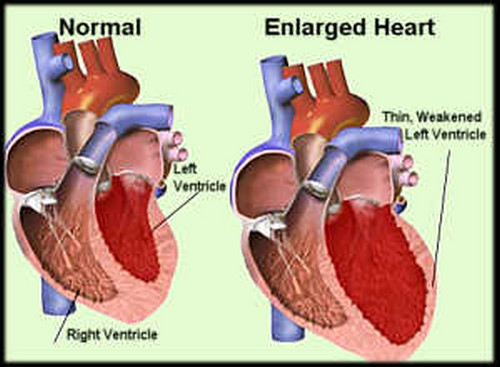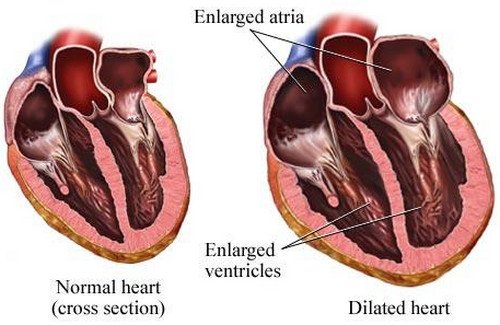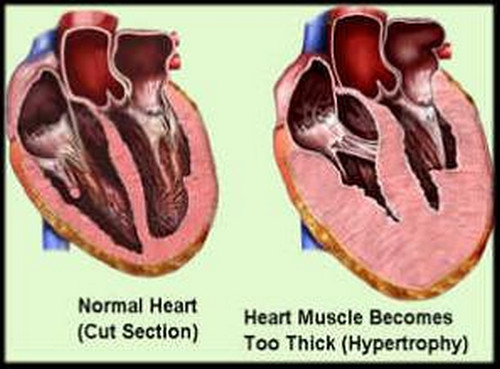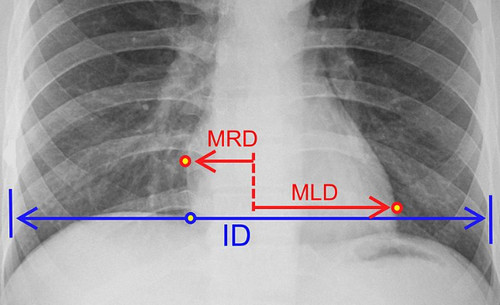Cardiomegaly
Last reviewed by Dr. Raj MD on January 12th, 2022.
What is Cardiomegaly ? Definition
The heart is a hollow muscular organ that pumps blood through different parts of the body. It is important to keep the heart healthy for it to function properly. If the heart is not functioning well, then the body will suffer.
Various organs will be affected and the body can’t cope with the internal stress. One of the serious heart conditions is cardiomegaly. It is the medical term for enlargement of the heart. Cardiomegaly is not a disease itself but a manifestation of an underlying health condition.
This condition can be temporary, but it can also be a chronic condition depending on the underlying cause. (1, 2)

Image 1: A comparison image between a normal healthy heart and an enlarged heart.
Picture Source: healthzene.com
 Photo 2: A normal heart and a heart with dilated cardiomyopathy. The ventricles are thin and enlarged (overly stretched.
Photo 2: A normal heart and a heart with dilated cardiomyopathy. The ventricles are thin and enlarged (overly stretched.
Image Source: www.heart-valve-surgery.com

Image 3: A comparison image of a healthy heart and a heart with hypertrophic cardiomyopathy.
Picture Source: glutenfreeworks.com
Types of cardiomegaly
- Dilated cardiomyopathy – It is when both ventricles of the heart are thin and stretched.
- Hypertrophic cardiomyopathy – it is when the walls of the heart is thick. (4)
What causes enlargement of the heart?
- High blood pressure
- Coronary artery disease
- Abnormality in the heart valve
- Infection of the heart (viral)
- HIV infection
- Genetic/hereditary
- Kidney-related disease (3)
- Peri-partum cardiomyopathy (the heart enlarges at the time of delivery)
- Idiopathic dilated cardiomyopathy (unknown cause)
- Congenital heart disease (born with enlargement of the heart)
- Arrhythmia (abnormal beating of the heart)
- Damaged caused by heart attack
- Pulmonary hypertension
- Anemia
- Pericardial effusion
- Thyroid disorder
- Substance abuse (alcohol and cocaine)
- Hemochromatosis (too much iron in the blood)
- Amyloidosis (abnormal build-up of protein in the tissues) (4, 5)
Symptoms/clinical manifestation
Enlargement of the heart most often does not cause any symptoms. It will only manifest if the heart is no longer pumping sufficient amount of blood.
If this happens, you will experience symptoms of congestive heart failure, which include shortness of breath, especially when lying flat or when performing strenuous activities, weight gain (midsection of the body), swelling of the legs, palpitation, and feeling tired. (5, 6, 7)
Who are at risk for enlargement of the heart?
- People with anemia are prone to cardiomegaly. If you have an anemia, your body lacks red blood cells. It causes the heart to beat faster and overtime your heart gets tired and enlarged.
- If you have a connective tissue disease, you are prone to having enlargement of the heart.
- Some patients are born with abnormalities in the structure of the heart. As the person grows old, there is a possibility of heart enlargement.
- Too much iron in the blood increases the possibility of heart enlargement. Excess iron is stored in the organs including the heart causing it to enlarge.
- Those who have a family history of cardiomegaly are at risk.
- Abnormal fluid collection around the heart will cause it to pump harder. Over time, the heart could get enlarged causing cardiomegaly.
- People with myocardial infarction are at risk for cardiomegaly.
- Those with problems in any of the heart valve can cause the heart to work harder than the usual. As time passes by, the heart gets tired and enlarged. Examples of disease that can affect the valves of the heart are congenital defects and rheumatic fever.
- An overactive and underactive thyroid gland can increase the possibility of cardiomegaly. (1, 4, 8, 9, 10)
Diagnosing Cardiomegaly
Cardiomegaly in its early stage can be quite difficult to diagnose considering that it is mostly asymptomatic. It is only diagnosed after consulting your doctor with symptoms similar to congestive heart failure.
The doctor will conduct various diagnostic studies and special test to accurately diagnose enlargement of the heart.
Ultrasound of the heart/Electrocardiogram – This test measures the size of the heart, the thickness of the muscles, and the pumping ability of the heart. As a matter of fact, it can help figure out the underlying cause of the enlargement of the heart.
Physical examination – The doctor will check for swelling and abnormal sounds when listening to your heartbeat using a stethoscope.
Chest x-ray – Cardiomegaly x-ray will help detect dilated cardiomyopathy as manifested by increased in the size of the heart. If the x-ray detects that the heart is enlarged, the doctor will immediately order other tests to find out the root cause of cardiomegaly.
To determine the size of the heart on chest x-ray, the cardio-thoracic ratio will be determined. To get the cardio-thoracic ratio, the transverse diameter of the heart will be compared to that of the thoracic cage.
If the result is more than 50%, then it is an indicator that there is indeed an enlargement of the heart. A new method used to determine the size of the heart using chest x-ray procedure is two dimensional cardiothoracic ratio. It is the ratio of the heart area to the chest area.

Photo 4: A chest x-ray film showing cardiothoracic ratio.
Image Source: en.wikipedia.org
Cardiac catheterization – It helps detect the location of blockage in the coronary artery. It also detects the size and pumping ability of the heart.
Blood work – It helps detect the factors leading to enlargement of the heart such as thyroid disease, viral infection, and so on.
MRI/CT scan – In certain situations, it can help detect an enlarged heart.
Biopsy – In rare instances, the doctor will order for a biopsy to find out the exact cause of enlargement of the heart.
Stress test – The patient is asked to walk on a treadmill or ride a stationary bike while the blood pressure, breathing, and rhythm of the heart is monitored. This test allows the doctor to assess the functions of the heart under exertion. (2, 3, 5, 6)
Cardiomegaly Treatment
Is it dangerous to have an enlarged heart? Yes! It is a life-threatening condition. Hence, it is important to address the condition in its early stage or as soon as the condition is diagnosed.
The focus of treatment is on the underlying cause. If the cause is coronary artery disease, the focus is to improve the flow of blood to the heart muscle. The best approach is to open the blockage in the blood vessels. Doing this can significantly improve the pumping of the heart. (2, 3)
If it is caused by hypertension, the focus is to control the blood pressure so as to prevent further damage. It is also important to stop the use of harmful substances such as illegal drugs and alcohol.
These vices are bad for your heart. If you have a heart valve disease, the damaged valve should be replaced. For congestive heart failure, the doctor will use a variety of treatment modalities such as:
- Diuretics – to alleviate swelling and get rid of excess fluid in the body.
- ACE inhibitors and beta-blockers – They are used to manage the blood pressure level and improve the overall condition of the heart.
- Implantable cardioverter-defibrillator – It is a device put into the chest that has the ability to restart the beating of the heart. It can also help improve the pumping of the heart. (4, 7, 8)
In a very rare instance, a heart transplant is performed. However, it should be the last resort. It should only be done if all other treatment methodologies failed. Cardiomegaly shouldn’t be taken lightly.
It is a serious condition that could lead to cardiac arrest or sudden death. If your heart is abnormally large, it will not be able to function properly. There will come a time when the heart itself will lack blood supply.
It will then affect the normal beating of the heart leading to cardiac arrest and death. (9, 10)
References:
- https://en.wikipedia.org/wiki/Cardiomegaly
- https://www.webmd.com/heart-disease/guide/enlarged-heart-causes-symptoms-types#1
- https://www.mayoclinic.org/diseases-conditions/enlarged-heart/symptoms-causes/syc-20355436
- https://www.belmarrahealth.com/enlarged-heart-cardiomegaly-causes-symptoms-diagnosis-treatment/
- https://www.medicinenet.com/enlarged_heart/symptoms.htm
- https://www.med.umich.edu/lrc/coursepages/m1/anatomy2010/html/clinicalcases/cardiomegaly/cardiomegaly.html
- https://www.livestrong.com/article/185678-what-are-the-treatments-for-cardiomegaly/
- https://healthzene.com/cardiomegaly-causes-treatment-symptoms/
- http://study.com/academy/lesson/what-is-cardiomegaly-definition-causes-symptoms.html
- http://www.medanta.org/cardiomegaly/